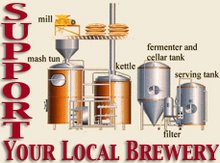 |
| Ale Street News publisher Jack Babin | |
| |
|
There's a new, smaller player on the take-home beer scene in the US.
But this sporty, angular container has been around since the early 1990s in the British Isles, letting pub patrons in the UK take a couple pours of their favorite ales to go and settle in at home for drinking with dinner, a movie on the DVR or just over some conversation about the day.
It's called the
Crafty Carton.
Ale Street News, based in Maywood in Bergen County, has partnered with the 2-pint container's company, LeisurePak, for a US rollout of the Crafty Carton. Ale Street hopes its 20-year standing in the craft beer industry can put the containers on the radar of bars, restaurants, brewpubs and breweries as a convenience option for take-home draft beer.
 |
| Contain your joy |
Publisher Jack Babin unveiled the product at the International Beer Expo in Secaucus last Saturday, explaining its uses and space-saving advantages to curious festivalgoers who paused at Ale Street's booth to examine the demo cartons, which bear an array of British ale brands and logos.
"It's a spontaneous, inexpensive, biodegradable, easy to store – we can store 50 of these in 4 inches by 4 inches – it's a ready-to-use beer carton," Jack said an interview with Beer-Stained Letter at the festival.
The thin-cardboard containers are instantly reminiscent of milk cartons. Or Chinese food containers. The latter is a good reference, since you don't buy Chinese takeout to stick in the refrigerator for an extended stay. You eat it upon arrival. And with the Crafty Carton, you drink the beer, Jack says. (The containers struck us an option to glass pitchers in busy bars; nothing to run through the dishwasher, just chuck 'em into waste-paper recycling. It's not unlike setting a carafe of coffee on a table.)
"This is not long-term storage. I don't want to miscommunicate. This is a temporary container. This is designed for when you get home, to enjoy your beer safely," he says.

The containers aren't intended as competition for everyone's trusty glass half-gallon or 2-liter growlers, either. But rather, the quart cartons (remember, 2 pints equals a quart) should appeal to those tavern or restaurant patrons who would like another round but wisely conclude they shouldn't because they still need to get home safely. With the Crafty Container, Jack says, those patrons can get that round to go and drink it at home. (There are carriers for the cartons to ensure they travel intact.)
"The pub owner is interested in this because they can sell two pints of beer they wouldn't sell otherwise," Jack reasons.
Crafty Container caught Ale Street's attention when its parent company, LeisurePak, placed advertising with the six-times -year brew newspaper. (The ad appears in the February/March issue). Jack says LeisurePak was then approached with the idea for a strategic partnership.
"We know virtually every brewery and brewpub. We not only know the names, we know the people behind them. We've been doing this for a long time," he says. "This (festival) is a launch, this is the very first place it has appeared in the United States. There will be a full rollout across the United States. We believe it's going to be a major convenience and a hit nationwide."
Photos from the International Beer Expo in Secaucus
 |
| Beach Haus crew with sips of new ale |
 |
| Matt Steinberg in the background |
 |
| Faces in the crowd |
 After lighting up the Twiter-sphere with the heads-up on Exit 8, Flying Fish then followed up with word that the beer is ready to be bottled, if only they had the bottles: "Our bottle supplier said we’d get them in December. Then January. Now those really cool, really limited 750 ml bottles are supposed to arrive in another two weeks. Keep your fingers crossed."
After lighting up the Twiter-sphere with the heads-up on Exit 8, Flying Fish then followed up with word that the beer is ready to be bottled, if only they had the bottles: "Our bottle supplier said we’d get them in December. Then January. Now those really cool, really limited 750 ml bottles are supposed to arrive in another two weeks. Keep your fingers crossed."

























